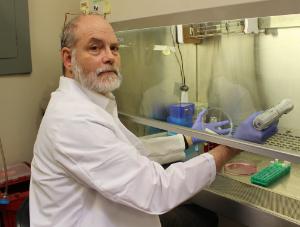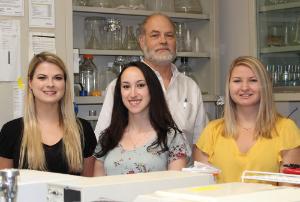

 |
| John G. Edwards, Ph.D. |
As NASA develops cutting-edge space flight technology, SpaceX works to reduce the cost of space travel, and engineers prepare to send astronauts deeper into space than ever before, an obstacle remains prevalent—the danger of radiation exposure. The price to pay for groundbreaking exploration often includes radiation sickness, a higher risk of cancer, detrimental effects on the central nervous system and the risk of other degenerative diseases. To protect the astronauts exploring the cosmos, John G. Edwards, Ph.D., professor of physiology at New York Medical College (NYMC), is working to identify high value drugs to protect astronauts from cosmic radiation exposure on long duration missions.
In 2019, Dr. Edwards received a $500,000 grant from NASA to launch his study, Countermeasures to Cosmic Radiation induced Cardiomyopathies. “The opportunity afforded by this grant will not only develop useful new information,” Dr. Edwards says, “but will also serve as a platform for training young scientists that are part of my laboratory.”
Inspired by the dangers of the cosmic exploration that astronauts face when they venture into space, Dr. Edwards hopes his research may help mitigate the chronic exposure to cosmic radiation faced by astronauts—which is especially dangerous because of its high energy level. According to Dr. Edwards, on Earth, the magnetosphere and atmosphere absorb nearly all of the energy from this form of radiation. However, as one ascends to the upper levels of the atmosphere, the level of protection decreases. “Currently, it is estimated that a mission to Mars will expose the flight crew to three times the allowable lifetime limit for radiation exposure,” he explains.
 |
|---|
| Edwards Lab |
While the primary intent of his research is to develop countermeasures to radiation exposure with the specific goal of protecting space crews on long duration missions, Dr. Edwards acknowledges that the findings of the project may also provide solutions to problems on Earth. For example, radiation therapy as a treatment for cancer, which has long been accepted as a necessary danger to patients, puts survivors at risk for various illnesses, including hormone imbalances, memory loss and soft-tissue sarcoma. “Radiation treatments, such as proton therapy, generate radiation at energy levels that are comparable to cosmic radiation,” he explains. “Airline pilots and flight attendants are also exposed to increased cosmic radiation during their careers is similarly dangerous, and report to increase their risk of cancer.”
Dr. Edwards has even considered the application of his research in a worst-case-scenario—should terrorism in the future include weapons that generate high radiation exposures. “Developing medicine to combat high radiation may not only save the lives of astronauts, but those on Earth,” he says, “I hope that one of the outcomes of this project is to contribute knowledge that other fields — not only in space exploration — will find useful,” Dr. Edwards says.
https://www.cnn.com/2019/08/05/health/deep-space-brain-radiation-study-scn/index.html